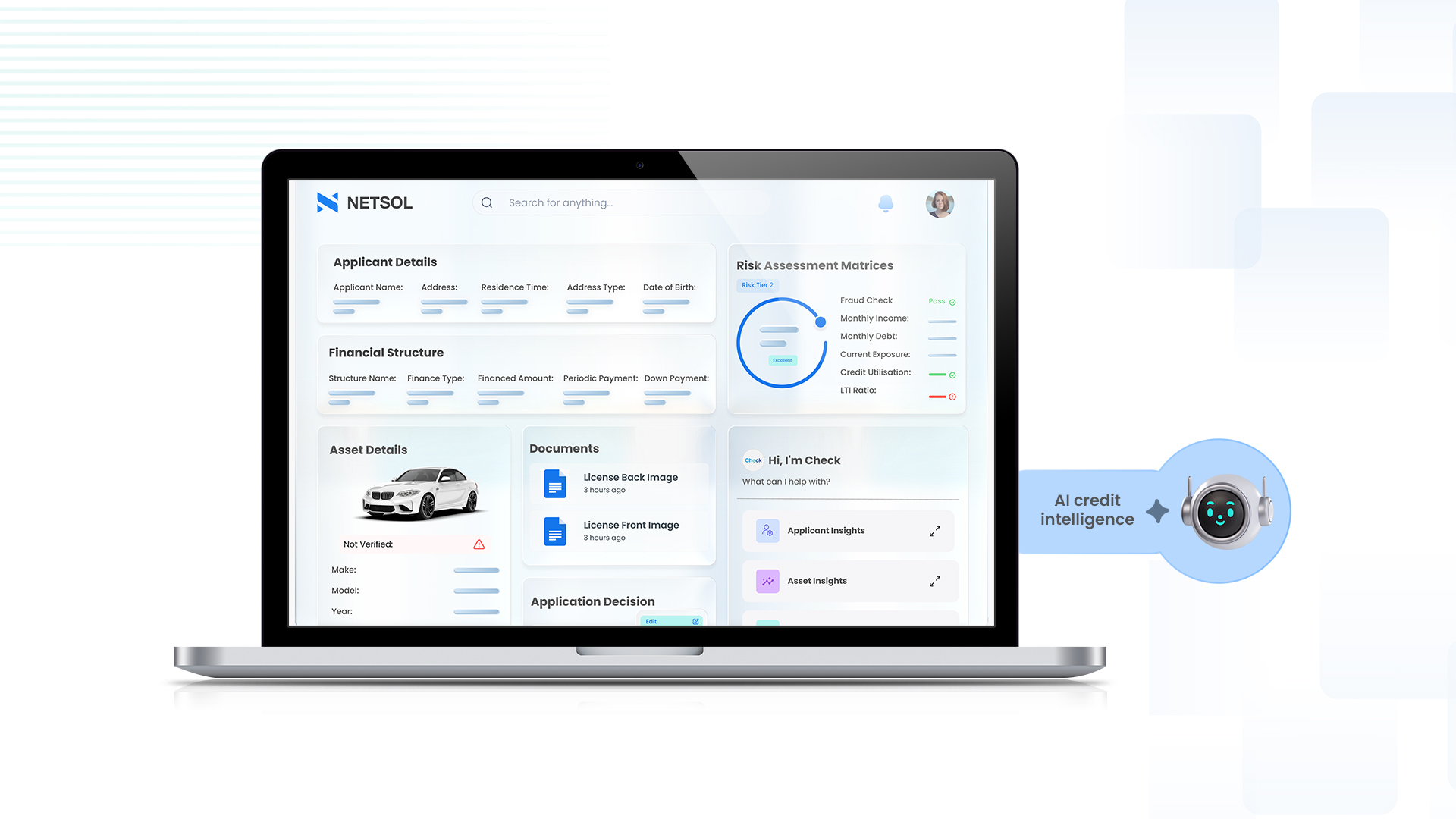Blog
Building Agile Teams in BFSI: How Staff Augmentation Enhances Efficiency
By NETSOL Technologies , on September 5, 2025
Discover how IT staff augmentation empowers GCC BFSI firms with agility, compliance, and speed to drive digital transformation in 2025

Introduction
If you’re in BFSI (Banking, Financial Services, and Insurance), standing still isn’t an option.
The GCC region’s financial sector in particular is growing rapidly, driven by digital banking adoption, fintech innovation, and ambitious economic diversification plans such as Saudi Arabia’s Vision 2030. In 2024, the GCC banking sector’s assets were estimated at over $3.5 trillion, with KSA alone accounting for more than 40% of the total regional assets, highlighting its dominant role in the region’s financial landscape (MEED Insights, 2024).
Market volatility, emerging digital challengers, and regulatory shifts are constant. In this environment, agility isn’t just a buzzword—it’s your competitive advantage and survival strategy. BFSI organizations in the GCC must adapt quickly to changing regulations, such as SAMA’s enhanced compliance requirements in Saudi Arabia, and keep pace with rapid digital transformation, including mobile banking, digital payments, and AI-powered financial services.
However, building and maintaining an agile workforce in BFSI can be a challenge. Staff augmentation has emerged as a game-changing solution, providing institutions with access to specialized talent without the burden of lengthy recruitment cycles or complex in-house training. This model supports rapid scalability and workforce flexibility, allowing BFSI firms to meet project deadlines, tackle regulatory challenges, and drive innovation efficiently—ensuring they stay ahead in a fast-evolving regional market.
Let’s explore how staff augmentation can boost agility in BFSI by examining when it’s necessary, the challenges involved, and the strong business case for including it in your workforce strategy.
Why agility matters more than ever
Despite its importance, many BFSI organizations in the GCC struggle to achieve true agility. According to McKinsey, banks that embrace agile models improve time-to-market by up to 40% and cut costs by 20–30%. Deloitte highlights “stagility”—the balance between stability and agility—as the key to thriving in disruption. PwC reports that 74% of BFSI executives see agility as the number-one driver of resilience.
But why now?
- Fintech competition: Challenger banks like Monzo and Chime launch features in weeks. Incumbents can’t afford 12-month cycles.
- Customer expectations: Clients expect seamless, hyper-personalized, and secure digital experiences across every channel.
- Regulatory turbulence: PSD2 (Revised Payment Services Directive), DORA (Digital Operational Resilience Act), Basel III (Basel Committee on Banking Supervision) and SAMA (Saudi Arabian Monetary Authority's) guidelines —compliance requirements are multiplying and evolving constantly.
- Cybersecurity risks: Statista reports BFSI is the most targeted industry for cyberattacks, with incidents rising over 22% in 2024.
In today’s reality, agility is not optional. It’s the ability to adapt fast, protect trust, and innovate securely. Staff augmentation helps overcome these barriers, enabling BFSI firms to integrate highly skilled experts quickly and maintain agility without the overhead of full-time hiring.
Why BFSI struggles with agility
- In-house skills are slow to build. Recruiting cybersecurity, compliance, and data specialists can take months. Certifications and training cycles add further delays.
- Shortage of experts. Demand for certified professionals (CISSP, CISA, ISO-27001) far exceeds supply.
- Legacy systems. Many BFSI firms still depend on siloed, outdated architectures that slow innovation.
- Compliance overhead. Each new regulation requires immediate expertise, but few firms can afford permanent teams for every scenario.
The result? Delays, missed deadlines, compliance risks, and lost market share.
Staff augmentation: People-first agility
Unlike outsourcing, staff augmentation consulting focuses on people, not projects. BFSI firms gain access to certified professionals who become part of their team, aligned with workflows, culture, and compliance.
Examples of BFSI staff augmentation services include:
- Cybersecurity experts (SOC2, ISO, PCI-DSS, penetration testing, fraud detection)
- Compliance analysts (PSD2, Basel III, DORA, SAMA)
- AI/ML engineers (fraud detection, risk scoring, chatbots)
- Cloud and DevOps specialists (core banking migration, digital transformation projects)
With IT staff augmentation services, BFSI organizations access “skills-on-demand”—high-caliber professionals available in days, not months. By leveraging staff augmentation, the BFSI leaders in GCC region can meet aggressive deadlines, reduce risk, and remain competitive in a rapidly evolving market.
IT staff augmentation models
As organizations strive to remain agile and competitive, IT staff augmentation offers a powerful strategic advantage. By enabling businesses to rapidly scale specialized teams, access top-tier talent, and drive innovation, the benefits of staff augmentation are clear. Enhanced operational flexibility, reduced time-to-market, and optimized resource allocation. Below, we explore the key staff augmentation models that can help your business maintain flexibility, optimize resources, and accelerate your digital transformation.
1. Team augmentation
In a rapidly evolving technology landscape, team augmentation empowers your business by seamlessly integrating highly skilled software developers or full teams into your operations as an extension of your in-house teams. Whether you require an expert in a specific technology or a complete software development team, this approach provides you with scalable solutions that eliminate lengthy hiring processes, allowing your teams to remain focused on high-priority business goals.
2. Nearshore staff augmentation
Nearshore staff augmentation offers the advantage of collaborating with engineers from neighboring regions. This model ensures cultural alignment and real-time collaboration through time zone compatibility, which is vital for businesses seeking efficient project delivery and speed-to-market. By tapping into nearby talent, organizations can strike a balance between proximity, cost efficiency, and operational flexibility.
3. Offshore staff augmentation
With offshore staff augmentation, organizations gain access to a global talent pool that provides cost-effective solutions without compromising on quality. By integrating remote teams from various regions, companies can leverage diverse skill sets and extend their working hours, ensuring that critical projects progress without delays. This model provides businesses with the scalability and expertise needed to maintain a competitive edge in a global marketplace.
4. Growth teams
Growth teams are an ideal solution for businesses focused on scaling rapidly and achieving long-term success. By bringing in experienced architects, senior developers, and subject matter experts (SMEs) in areas such as data, QA, and DevOps, you can accelerate your path to success. These teams are equipped to drive innovation, tackle complex challenges, and help you navigate the evolving demands of your business with efficiency and speed.
The business case for BFSI staff augmentation services
When it comes to BFSI projects, time-to-market, cost-efficiency, and access to top talent can make or break success. The demand for highly specialized skills in areas like cybersecurity, compliance, and data management often outpaces the ability of traditional hiring processes to meet these needs.
In such cases, staff augmentation presents a cost-effective, scalable, and time-sensitive solution. This section outlines the business case for staff augmentation in BFSI by demonstrating how leveraging external talent can optimize operations, reduce overheads, and accelerate project timelines.
- Speed to market: Firms using augmentation launch products 20% faster (Forrester).
- Cost efficiency: Staff augmentation reduces project costs by up to 30% vs. permanent hiring (Harvard Business Review).
- Talent access: 62% of organizations say augmentation improves acquisition and retention of scarce skills (PwC).
- Flexibility: Ramp teams up or down without overhead, keeping pace with evolving needs.
- Resilience: McKinsey finds flexible workforce models correlate with up to 2.4× revenue growth.
When BFSI should opt for staff augmentation
Staff augmentation isn’t just for crisis management. It’s about positioning your team for agility and growth, so you’re always ready for the next challenge. Staying ahead of competition and regulatory demands requires a combination of speed, expertise, and flexibility. Staff augmentation provides a strategic solution when certain internal limitations become bottlenecks or specialized skills are required for a temporary need.
Below, we outline the most common scenarios when BFSI firms should consider adopting this approach.
Challenges & best practices
While staff augmentation offers tremendous potential, BFSI organizations face unique challenges when integrating external professionals. These challenges can range from ensuring cultural alignment to maintaining compliance with complex regulatory frameworks.
Understanding the key obstacles, as well as implementing best practices to overcome them, is essential to ensuring that your augmented team can contribute to your goals effectively. Here, we dive into the specific hurdles BFSI firms face and highlight actionable strategies to ensure a smooth and successful implementation of staff augmentation.
Key challenges
- Cultural alignment with external staff: In highly regulated banking environments, misalignment in work culture can slow collaboration and impact sensitive processes like KYC or AML reviews.
- Knowledge loss when contracts end: BFSI projects often involve proprietary platforms (core banking, risk engines, compliance modules). If knowledge walks out the door with contractors, it can disrupt audits and future upgrades.
- Managing distributed/remote contractors: With customer data subject to strict residency laws (e.g., GDPR, local banking regulations), ensuring secure workflows and compliance across remote teams becomes a challenge.
- Regulatory and compliance consistency: Augmented staff must be continuously aligned with evolving laws like Basel III, PSD2, DORA and SAMA—any oversight could result in heavy penalties.
- Trust and data sensitivity: Financial institutions handle sensitive data daily. Even a perception of mishandling by external staff can erode customer trust and regulatory confidence.
Best practices
- Define KPIs and clear roles: Ensure every augmented professional has measurable targets tied to BFSI outcomes such as faster onboarding, reduced fraud incidents, or compliance deadlines met.
- Treat augmented staff as part of the squad: Inclusion in sprint reviews, stand-ups, and compliance briefings creates ownership and accountability.
- Use collaboration tools for smooth integration: Platforms like Jira, Confluence, and Slack reduce silos and maintain visibility across in-house and augmented teams.
- Assign mentors for knowledge transfer: Pair augmented staff with permanent employees to safeguard critical institutional knowledge for audits and future projects.
- Embed compliance training upfront: Before deployment, provide tailored onboarding on your bank’s security, risk, and compliance frameworks.
The future of agile BFSI teams
Agile BFSI teams will be hybrid: permanent employees, augmented professionals, and automation working side by side.
Accenture predicts that by 2025, 75% of BFSI leaders will rely on hybrid workforce models. The next wave will be AI-enabled staff augmentation—matching certified experts to BFSI projects in real time. AI-enabled staff augmentation will further streamline the process, matching certified experts to projects in real-time, enabling GCC BFSI firms to maintain agility while staying compliant and innovative.
Agility you can trust
In BFSI, speed + compliance + trust = survival. Staff augmentation in BFSI ensures firms can close skill gaps instantly, scale securely, and deliver with confidence—without the delays of traditional hiring.
For financial institutions, the choice is clear: build agility into your workforce strategy now or risk falling behind.
Maximize operational efficiency with NETSOL
NETSOL brings decades of BFSI expertise and a global pool of certified professionals. From cybersecurity to compliance to AI-driven transformation, our staff augmentation services help financial institutions stay compliant, agile, and competitive.
Ready to elevate your financial institution’s agility?
Connect with NETSOL today and discover how our BFSI staff augmentation services can fast-track your success in 2025 and beyond.
Related blogs

Blog
From credit checks to credit intelligence: How AI is redefining underwriting for captives

Blog
Shared financing models for high-value assets unlocking Indonesia’s next wave of growth

Blog



